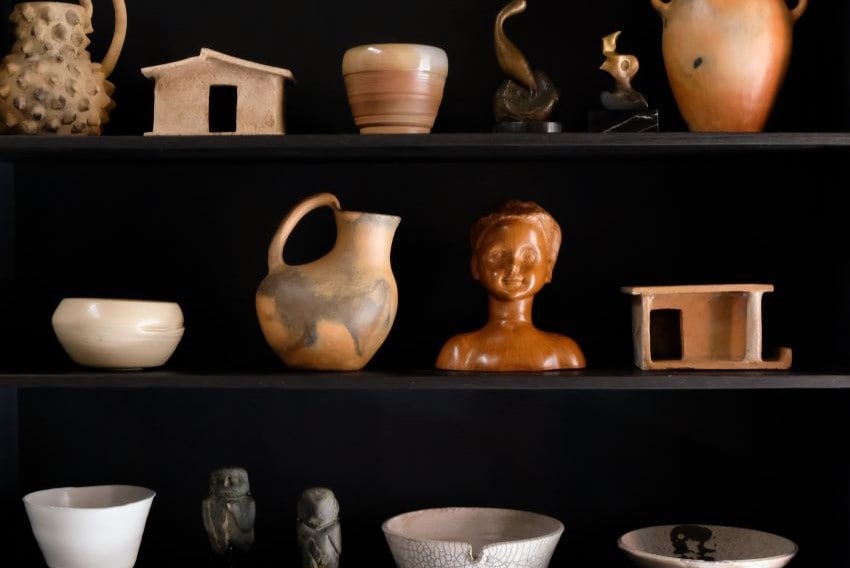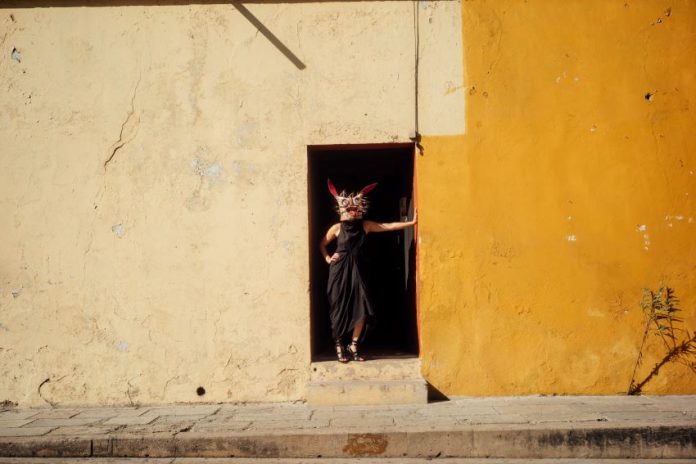Curator and potter Stellah de Ville fell in love with Mexico the first time she visited Mexico City in March 2020. From then on, the then-Brooklyn-based Australian artist had a life in Mexico on her mind, and when the COVID-19 pandemic lockdowns began, she knew she wanted to use the time “not to bake bread but to double down on my art practice.” She quickly made an “emotional and reckless decision” to move to a new country, in her own words. And it’s paid off.
Today, de Ville owns Stellah Gallery in Oaxaca. She had heard about the dynamic art, ceramics, mezcal and textile scenes in the city before visiting, and she and her partner were instantly smitten “by the ancientness of the city, the warmth of the people, the underlying sacredness and awareness of beauty and how it’s folded into the culture so entirely.”
“It was profound for me,” de Ville says of her first trip to Oaxaca, “Time just passes differently there.”
Upon moving to Oaxaca, some of the things that most humbled de Ville were the talent of the local artists, weavers, crafters and potters, and how welcoming they all were. “I didn’t know anybody in the art scene when I got there, but people just started walking through the door and visiting. They’d bring artwork, or I’d go and visit their studios. The tradition of ‘making’ in Oaxaca is unparalleled, and that was so intriguing; people have all this ancestral knowledge about materials, local clays, everything,” she says.
The most surprising thing for her about launching a business in Mexico was getting things off the ground. “It’s an exercise in patience and listening. Things in Mexico happen on their own schedule. You have no control… and you have to be there [physically]. People value your presence, you can’t dial it in and have a proxy. People in Oaxaca listen to each other. It’s important to be in dialogue, ask questions and be prepared to hear answers. And work with local people at every stage. They are invested in the city and make fantastic partners.”
Living in Oaxaca for the past two years, de Ville learned to appreciate living lightly on the land, the worth of precious resources and the openness of the creative community to collaboration. “I wanted to be in a space like that for a long time, and I wasn’t finding it in the Bay Area or New York.”

The artist and curator’s original plan in Oaxaca was to open a ceramics studio for herself. However, a few weeks after she arrived, she was walking down the street when she saw a piece of paper attached to a pole advertising a space for rent in Centro, which ended up her gallery space. “I was just saying yes to things,” she said.
The dark, organic and intimate gallery de Ville has created feels almost magical. A slash cut into the ceiling lets in natural light; the front door is often propped open and it’s not uncommon to find an artist painting by candlelight inside. It feels nothing like a space you would find on either coast of the United States.
The gallery’s clay walls were cured in a traditional technique using fermented nopales. “You mix nopales, pigment and clay and make a slurry that ferments and is used to finish walls. It’s wonderful because, unlike latex paint, it breathes and absorbs moisture when it’s damp and releases it when it’s dry. And it doesn’t cost much. It’s really beautiful,” she said.
Since moving to Mexico, de Ville has started working with and incorporating local wild clays and sands into her ceramics and glazes. She’s also embraced imperfection – the extreme heat, aridness, and humidity of Oaxaca can cause clay to crack or degrade. But the biggest way her art has changed is through her evolving relationship with color. “Oaxaca is full of unexpected color combinations and I am working with color in a way I never have before,” she explained.

In the spirit of saying yes to things, the artist has also embarked on a new project in Mexico City and is now splitting her time between the two cities. “We’re renovating a 1930s house in Roma Sur that was used for film production for a decade. She’s a very beautiful, classic Roma style [house] – a beautiful ruin,” she said of the home with space for a ceramics studio, gallery space where she hopes to host guest curators, and rooms to host salons, events and more.
De Ville, who has worked as an interior design consultant, previously renovated a gorgeous house in Oaxaca, too. It’s on Airbnb, but with its chef’s kitchen and gorgeous finishings, she hopes for it to become a hub for visiting chefs who want to explore the food scene, test recipes or even host dinners. “We renovated the house thinking it was gonna be our forever home, and then life happened,” she explained.
Mexico City was also presenting other opportunities. De Ville was offered an artist-in-residency opportunity at LAGOS and is currently showing her ceramics at Chic By Accident.
The longtime lover of the Oaxacan spirit remembers discovering a tiny bottle of delightful mezcal in a cafe in Mazunte last year and reaching out to the makers in Oaxaca City. Soon, they began collaborating on bringing rare mezcals – usually no more than 100 liters – to the public in pretty glass bottles with labels printed on a 200-year-old press. “They are such a pure expression of place. Mezcal is like plant medicine. These were designed to be sipped in small quantities. It’s a way to connect people with Oaxaca,” she said of the mezcal line, appropriately named Stellah Mezcal.
“Our plan for the new house in the new year is to have these ceremonial events where we drink the mezcal out of handmade cups I’m making, like tea ceremonies but with mezcal,” she said.
De Ville followed her artistic intuition to Mexico. By saying “yes” at several pivotal moments, she is building organic, creative collaborations that blend modern sensibilities with ancestral knowledge.
Laurel is a nomadic lifestyle journalist whose favorite stories focus on weird and wonderful travel and culture. Her work has appeared in The Wall Street Journal, Vice, BBC Travel, Travel + Leisure, South China Morning Post, The Culture Trip and more.
@laureltuohy, www.laureltuohy.com
